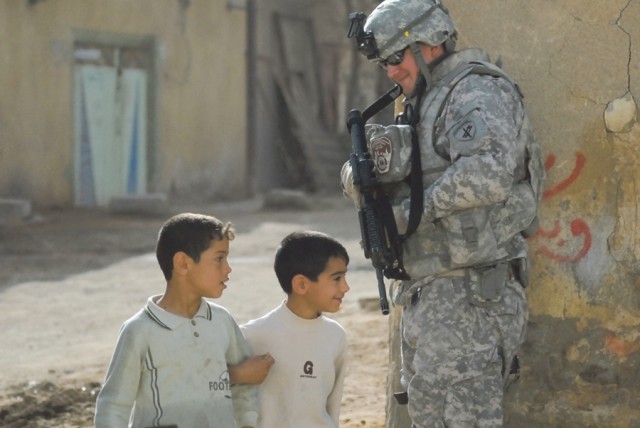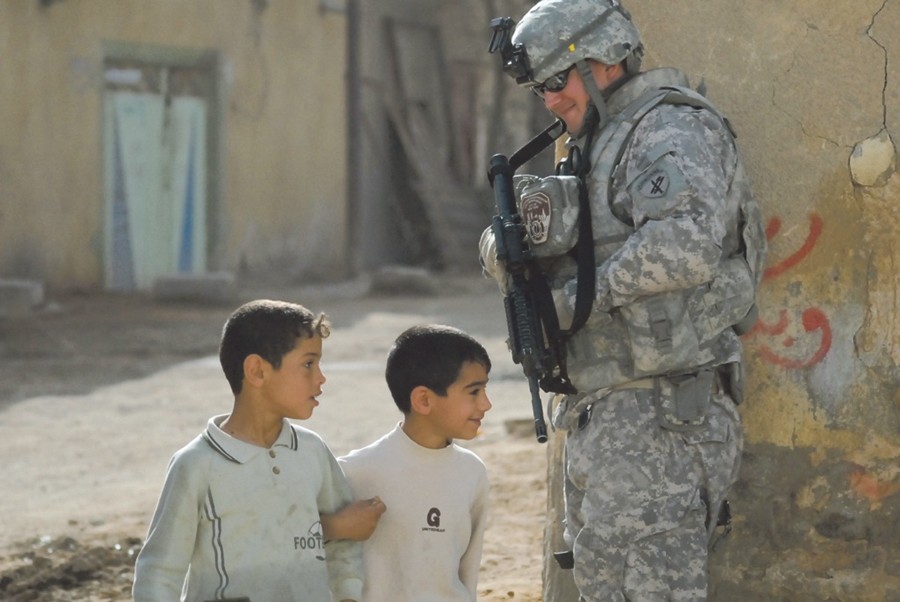
FORT BENNING, Ga. - Iraqi authorities were "clearly out front" in providing security during the country's recent national elections, but the mission is not over as the groundwork continues being laid for an eventual pullout of U.S. forces, 3rd Heavy Brigade Combat Team leaders said during a video teleconference Monday.
Sledgehammer Brigade, 3rd Infantry Division, which is approaching the midway point of its yearlong deployment, provided assistance around 1,297 polling sites in five provinces south of Baghdad, said Col. Pete Jones, the 3rd HBCT commander. The March 7 elections were Iraq's second for a full parliamentary term since the 2003 U.S.-led invasion ousted Saddam Hussein. An estimated 18 million people cast votes - a turnout of 61 percent.
"This election is going to put in place the government we build a strategic partnership with," Jones said. "It's significant in the fact a democracy is not built on one election. It takes two elections for a peaceful transition of power ... Our Soldiers realize this is a part of history they can go back and talk to their children and grandchildren about."
The 3rd HBCT has about 4,000 Soldiers spread over Babil, Karbala, Najaf, Diwaniyah and Wasit provinces.
Jones said attacks in Baghdad and northern Iraq resulted in 40 dead and more than 100 injured, but polling sites remained open across the country.
There were 14 "low-yield" incidents - small roadside bombs and projectiles - in Babil province, where an Iraqi police officer was killed and another wounded, but violence overall was minimal compared to the first national election in 2005, said LTC Robert Ashe, commander of 2nd Battalion, 69th Armor Regiment. Five of the attacks were in the vicinity of polling facilities, but none occurred on site.
"That speaks volumes in terms of Iraqi Security Forces providing a secure environment," Ashe said. "The populace saw the Iraqi Security Forces ... as their protectors. The elections were the defining event that really showed they could do this."
LTC Ken Harvey, commander of 1st Battalion, 15th Infantry Regiment, said he saw the same success in Najaf and Diwaniyah provinces, where 2.2 million people voted at 526 polling sites.
"Even three days later, they still wanted to show you the ink on their fingers," he said. "It was a tremendous victory for the Iraqi people."
Jones said he went to all five provinces in the span of about nine hours. He described an almost "festive atmosphere" in which kids played soccer games on city blocks and children entered polling places with their parents to watch them vote.
"Everything here is built on relationships and partnerships, and those take time," he said. "This election fortified that. It showed we allowed them to truly take the lead. Our challenge now is to seize on that opportunity."
The 3rd HBCT leaders also discussed the road ahead for American forces. Jones said at least one more unit will follow Sledgehammer Brigade in Iraq.
President Barack Obama has announced a withdrawal date of Dec. 31, 2011, for all U.S. troops.
Jones said the focus remains on advising Iraqi security forces while strengthening their processes, systems and procedures. Soldiers will continue a "train-the-trainer" approach with the Iraqis and add to their work with provincial reconstruction teams, he said.
In the past four months, more than 200 small-business grants have been arranged for local projects ranging from agriculture to electricity, Ashe said. He said the change in mission focus is evident to the Soldiers, many of whom are on their fourth Iraq deployments.
"Iraqi Security Forces have progressed very well over the years. What you have is a confident and capable force that is clearly out front," Ashe said. "We continue to provide support ... (but) the Soldiers here are seeing success. They've seen the high-intensity conflict before. It's gone from kicking in doors to capacity building now."
Harvey said his Soldiers work frequently with Iraqi police and "they too have improved astronomically" from earlier Operation Iraqi Freedom rotations.
"Now, they are habitually the first to arrive on any scene," he said. "We are actually seeing the fruits of all the previous efforts of our Soldiers. It's an amazing time to be in Iraq."
But the Iraqis realize they have a limited amount of time left with U.S. troops, Harvey said. After past deployments, Iraqi security forces always asked the Americans for equipment, trucks and ammunition. As the pullout nears, their questions are oriented more toward system fixes and training, he said.
Increased support from the population will help Iraqi authorities deal with the threats that remain, Ashe said.
"The confidence of the people is there, and they don't want to go backwards," he said. "They will tell you now they're responsible for ensuring our security."
Jones said the U.S. military has a "trusted partner (in Iraq) built on mutual sacrifices" over the last seven years.
"We have no ulterior motive in truly wanting to build trust and see them succeed," he said. "We're here to help them succeed, because our success is their success."

Social Sharing